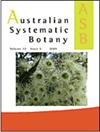Leaf fossils show a 40-million-year history for the Australian tropical rainforest genus Megahertzia (Proteaceae)
IF 1.6
3区 生物学
Q4 EVOLUTIONARY BIOLOGY
引用次数: 0
Abstract
ABSTRACT Well-preserved leaf fossils from the Middle Eocene Anglesea site in Victoria are assigned to a new species of Megahertzia (M. paleoamplexicaulis R.J.Carp. & Rozefelds), a genus of Proteaceae now represented by a single species, M. amplexicaulis A.S.George & B.Hyland, in the Wet Tropics rainforests of Queensland. Megahertzia-like cuticular remains also occur in the Eocene Mount Hotham assemblage of Victoria, and pollen closely conforming to Megahertzia (i.e. Proteacidites latrobensis W.K.Harris) occurs widely in Cenozoic sediments of Australia and in New Zealand. All these records add to other fossil evidence that many species of Australian rainforest Proteaceae are the last vestiges of formerly much more widespread lineages. The fossil leaves are near-identical in architecture and cuticular features to lobed leaves of M. amplexicaulis, including that they have small teeth, stomata in well-defined areoles, and fine cuticular striations. Moreover, where preserved, the leaf fossils show amplexicaul bases, a unique (apomorphic) trait of the extant species. The apparent absence at Anglesea of simple (unlobed) leaves in Megahertzia and two other taxa of fossil Proteaceae is discussed; this leaf type could have evolved convergently in response to forest canopy heat increase as Australia drifted towards the Equator.叶子化石显示了澳大利亚热带雨林中巨藻属(变形科)4000万年的历史。
摘要:维多利亚州中始新世安格尔西岛遗址保存完好的叶化石被归入一个新种Megahertzia(M.paleoamplexicalis R.J.Carp.&Rozefelds),这是一个蛋白质科的属,目前在昆士兰的热带雨林中以一个单种M.samplexicalis a.S.George&B.Hyland为代表。类似Megahertzia的表皮遗迹也出现在维多利亚州始新世的Mount Hotham组合中,与Megahertzizia(即Proteocidites latrobensis W.K.Harris)密切一致的花粉广泛出现在澳大利亚和新西兰的新生代沉积物中。所有这些记录增加了其他化石证据,证明澳大利亚雨林蛋白质科的许多物种是以前广泛分布的谱系的最后遗迹。化石叶在结构和表皮特征上与抱茎M.amplexicalis的裂叶几乎相同,包括它们有小牙齿、在明确的乳晕中的气孔和精细的表皮条纹。此外,在保存的地方,叶化石显示出抱茎基部,这是现存物种的一种独特(变形)特征。讨论了Megahertzia和Proteaceae化石的另外两个分类群在安格尔西亚明显不存在简单(未脱落)的叶子;随着澳大利亚向赤道漂移,这种叶型可能会随着森林树冠热量的增加而趋同进化。
本文章由计算机程序翻译,如有差异,请以英文原文为准。
求助全文
约1分钟内获得全文
求助全文
来源期刊

Australian Systematic Botany
生物-进化生物学
CiteScore
3.10
自引率
12.50%
发文量
12
审稿时长
>12 weeks
期刊介绍:
Australian Systematic Botany is an international journal devoted to the systematics, taxonomy, and related aspects of biogeography and evolution of all algae, fungi and plants, including fossils. Descriptive taxonomic papers should normally constitute a comprehensive treatment of a group. Short papers on individual species and nomenclatural papers must contain significant new information of broader interest to be considered. The prestigious L.A.S. Johnson Review Series is published. Other review articles will also be considered. All papers are peer reviewed.
Australian Systematic Botany is published with the endorsement of the Commonwealth Scientific and Industrial Research Organisation (CSIRO) and the Australian Academy of Science.
 求助内容:
求助内容: 应助结果提醒方式:
应助结果提醒方式:


